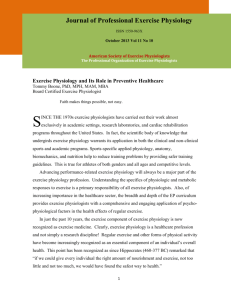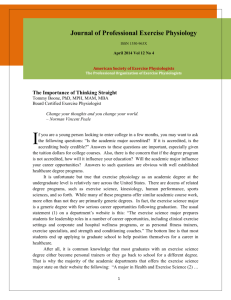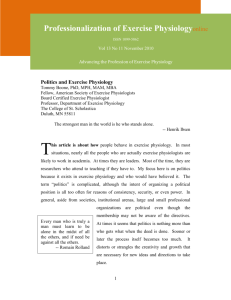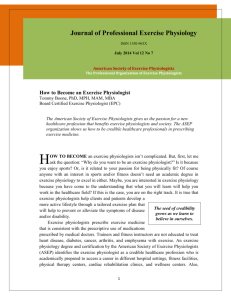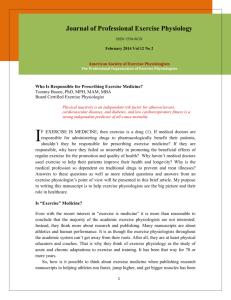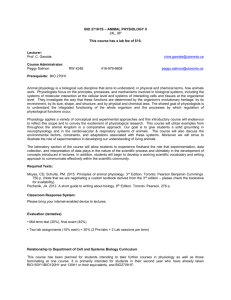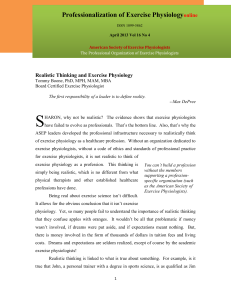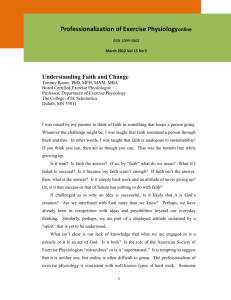December 2013: Invitation to Professionalism
advertisement
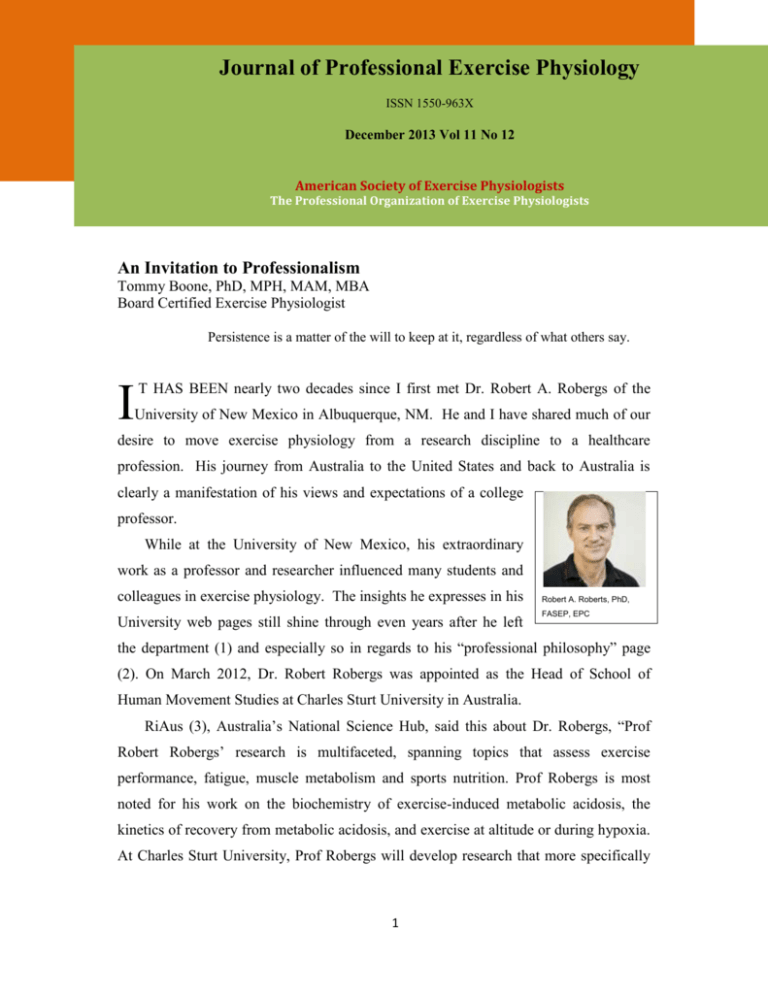
Journal of Professional Exercise Physiology ISSN 1550-963X December 2013 Vol 11 No 12 American Society of Exercise Physiologists The Professional Organization of Exercise Physiologists An Invitation to Professionalism Tommy Boone, PhD, MPH, MAM, MBA Board Certified Exercise Physiologist Persistence is a matter of the will to keep at it, regardless of what others say. I T HAS BEEN nearly two decades since I first met Dr. Robert A. Robergs of the The Professional Organization of Exercise Physiologists University of New Mexico in Albuquerque, NM. He and I have shared much of our desire to move exercise physiology from a research discipline to a healthcare profession. His journey from Australia to the United States and back to Australia is clearly a manifestation of hisProfessional views and Organization expectations of ofExercise a college The Physiologists professor. While at the University of New Mexico, his extraordinary work as a professor and researcher influenced many students and colleagues in exercise physiology. The insights he expresses in his University web pages still shine through even years after he left Robert A. Roberts, PhD, FASEP, EPC the department (1) and especially so in regards to his “professional philosophy” page (2). On March 2012, Dr. Robert Robergs was appointed as the Head of School of Human Movement Studies at Charles Sturt University in Australia. RiAus (3), Australia’s National Science Hub, said this about Dr. Robergs, “Prof Robert Robergs’ research is multifaceted, spanning topics that assess exercise performance, fatigue, muscle metabolism and sports nutrition. Prof Robergs is most noted for his work on the biochemistry of exercise-induced metabolic acidosis, the kinetics of recovery from metabolic acidosis, and exercise at altitude or during hypoxia. At Charles Sturt University, Prof Robergs will develop research that more specifically 1 addresses the role of exercise and physical fitness in disease prevention and rehabilitation in diverse special populations.” Even though the question of “what does professionalism mean to a profession” is increasingly being analyzed across the health and social care professions, it is absolutely imperative that exercise physiologists do the same. After all, the discussion of professionalization of exercise physiology cannot help but put exercise physiology on the right track. One reason, in particular, is the use of performance enhancing substances by athletes and doping in sports. Aside from coaches and trainers who encourage cheating to run faster and develop bigger muscles, the academic exercise physiologists (i.e., college teachers) who teach sports nutrition are also encouraging the use of sports supplements (4). Understandably, for teachers to encourage supplement use is simply wrong on many levels (5, 6). To my knowledge, the idea of “what is” unprofessional behavior by academic exercise physiologists and “why” both should be hot topics at meetings and in the classroom has not been discussed. The primary reason appears to be due to the fact that the doctorate-prepared exercise physiologists are not introduced to the study of professionalism. However, unless exercise physiology is to become personal training, there is reasonable expectation that exercise physiologists will embrace the profession as healthcare practitioners. That is why the ASEP leadership expects that there will be more emphasis placed on ethical issues and standards of professional practice. Whether it is appropriate to promote sports supplements in sports nutrition classes will no doubt be discussed in detail in years to come. The ASEP Code of Ethics (7) helps to define and distinguish between the views of the exercise physiologist and those consistent with a non-cheating philosophy in sports. It is simply wrong to knowingly misrepresent sports supplement information during lectures with students and/or other teaching professionals. The significance of the Code is that students and professionals in the study and application of exercise physiology to health, fitness, exercise, preventive and rehabilitative services can turn to it for guidance in professional conduct. Adherence to the Code is expected, and is based on the belief that exercise physiologists are self-regulated, critical thinkers who are accountable and 2 responsible for their high quality competence in the practice and the delivery of exercise physiology concepts, ideas, and services. 1. Exercise physiologists should accurately communicate and provide health and fitness, educational, preventive, rehabilitative, and/or research services equitably to all individuals regardless of social or economic status, age, gender, race, ethnicity, national origin, religion, disability, diverse values, attitudes, or opinions. 2. Exercise physiologists should be responsible and accountable for individual non-medical judgments and decisions about health and fitness, preventive, rehabilitative, educational, and/or research services. 3. Exercise physiologists should maintain high quality professional competence through continued study of the latest laboratory techniques and research in preventive and rehabilitative services. 4. Exercise physiologists are expected to conduct health and fitness, preventive, rehabilitative, educational, research, and other scholarly activities in accordance with recognized legal, scientific, ethical, and professional standards. 5. Exercise physiologists should respect and protect the privacy, rights, and dignity of all individuals by not disclosing health and fitness, rehabilitative, and/or research information unless required by law or when confidentiality jeopardizes the health and safety of others. 6. Exercise physiologists are expected to call attention to unprofessional health and fitness, preventive, rehabilitative, educational, and/or research services that result from incompetent, unethical, or illegal professional behavior. 7. Exercise physiologists should contribute to the ongoing development and integrity of the profession by being responsive to, mutually supportive, and accurately communicating academic and other qualifications to colleagues and associates in the health and fitness, preventive, rehabilitative, educational and/or research services and programs. 8. Exercise physiologists should participate in the profession's efforts to establish high quality services by avoiding conflicts of interest and endorsement of products in the health and fitness, preventive, and/or rehabilitative services and programs. 9. Exercise physiologists should participate in and encourage critical discourse to reflect the collective knowledge and practice within the exercise physiology profession to protect the public from misinformation, incompetence, and unethical acts. 3 10. Exercise physiologists should provide health and fitness, preventive, rehabilitative, and/or educational interventions grounded in a theoretical framework supported by research that enables a healthy lifestyle through choice. Dr. Robergs raised several questions in his support of ASEP and the importance of a Code of Ethics and Standards of Practice for exercise physiologists. He wrote (2) that, “As a university-based exercise physiologist, who directs my functions? Is there any external body that oversea how the faculty functions in exercise physiology within their discipline? What is my code of ethics? How can my functions be fairly evaluated if there are no standards, devised by exercise physiologists, for my peers to read, understand, and implement in their evaluation of me? What does all this mean to the quality of the work that I do, and more importantly, to the consistency of the standards of this quality between the different exercise physiology programs throughout the USA?” For a detailed analysis of the importance and potential application of the Code of Ethics for exercise physiologists, refer to the 2002 article published in PEPonline. In closing, several points from the article (7) are worth revisiting. These points were mentioned in the context of “The Exercise Physiology Code of Ethics: A Dilemma or a Standard of Conduct?” They are: 1. It’s time to stop and take measure of these questions and to be mindful of the kind of behavior that arises when there isn’t a Code. We owe our students more thought and analysis on this subject. If what we have been doing is ethical, is it acceptable to continue doing so? If it is unethical (and therefore unacceptable), then something must change. 2. Denial is complex, ambiguous, and hard to understand. It is also a serious problem when it comes to professional conduct. What is important to note here is that if the exercise physiology Code of Ethics is not recognized, then distinction as a profession is not possible. We must recognize the fundamental changes underway in the delivery and practice of exercise physiology if we are to provide a means of professional self-regulation. The Code cannot be a fad or a fabric of the emerging profession that is seldom discussed or embraced. There must be an enduring commitment to the Code and to ethical research in exercise physiology. 4 3. As far as I am concerned, seldom is the opportunity for change so desperately needed. Members of the emerging profession must ask themselves, “Who are we and what is our purpose?” And, in fact, seldom have so many good college teachers failed to acknowledge the cultural change before them. This fact alone is a significant loss in confidence in those who profess to nurse and/or build the curricula of job opportunities through their teaching. Yet despite the hardships of our students when they graduate, those who enjoy tenure continue to do so while their students have a hard time in finding a job to secure finances. Today’s professors are faced with the challenge of not just shared values and education but the question of careers, too. Whether we like it or not, the current system is not working. The caveat here is critical: College teachers must come to understand that professional programs of study are grounded in ethical reasoning, moral concerns, and values that reflect upon the students and the profession. Why? “A code of ethics is a formal statement of the company’s ( organization’s) values concerning ethics and social issues; it communicates to employees (members) what the company (organization) stands for” [9]. As members of the ASEP organization, they will almost surely face ethical dilemmas. The answers to the following questions [9-11] will help you to think about the professional, social, and ethical consequences of your actions, relationships, and/or research proposals: Is the dilemma really what it appears to be? If you are not sure, it is your responsibility to find out. Is the action, relationship, and/or proposal you are considering legal and/or ethical? If you are not sure, it is your responsibility to find out. Do you understand the thinking and/or rationale of those who oppose the action you are considering or you are presently engaged in doing? If you are not sure that you can justify your actions, it is your responsibility to speak with a person who does and come to terms with the dilemma. Does your action, relationship, and/or proposal benefit you, yet may harm others (if nothing else by misinformation)? If you are not sure, it is possible that your involvement may be a mistake. Are you convinced of the benefit of the action, relationship, and/or proposal that you would encourage everyone to purchase and/or consume or use the product? If you are not sure, it is your responsibility to determine the scientific merit of the product. Have you considered speaking with a person who has scientific knowledge about the product? If you have not done so, why not? Knowing what to think is not always easy. Speaking with someone who would be objective may be very helpful. 5 Would your action, relationship, and/or proposal be embarrassing to you if others knew what you were doing? If you are not sure, it is your responsibility to find out. Ask a friend from a related area of work or, perhaps, a coworker. References 1. Robergs, R. A. (2012). Home Page. Welcome to My Website. (Online). http://www.unm.edu/~rrobergs/index.htm 2. Robergs, R. A. (2013). Professional Philosophy. (Online). http://www.unm.edu/~rrobergs/philosophy.htm 3. AiAus. (2013). Robert Robergs. (Online). http://riaus.org.au/people/robertrobergs/ 4. Boone, W. T. (2006). Is Sports Nutrition for Sale? Ethical Issues and Professional Concerns for Exercise Physiologists. Nova Science Pub Inc. (Online). http://www.amazon.com/Sports-Nutrition-Sale-ProfessionalPhysiologists/dp/1594544220 5. Boone, T. (2004). Cheating in Sports: What Should Exercise Physiologists Think? Professionalization of Exercise Physiologyonline. 7;7 (Online). http://faculty.css.edu/ tboone2/asep/ CheatingWhat Exercise Physiologists Think.html 6. Boone, T. (2003). Cheating in Sports. Professionalization of Exercise Physiologyonline. 6;9 (Online). http://faculty.css.edu/tboone2/ asep/ CheatingInSports.html 7. American Society of Exercise Physiologists. (2013). ASEP Code of Ethics. (Online). http://www.asep.org/?q=organization/ethics 8. Boone, T. (2002). The Exercise Physiology Code of Ethics: A Dilemma or a Standard of Conduct? Professionalization of Exercise Physiologyonline. 5;11 (Online). http://www.asep.org/ asep/asep/EXERCISEPHYSIOLOGYCodeOf Ethics.html 9. Daft, R. L. & Marcic, D. (1998). Understanding Management. (2nd Edition). New York, NY: The Dryden Press. 6 10. Pagano, A. M. & Verdin, J. A. (1988). The External Environment of Business. New York, NY: Wiley. 11. Badaracco, J. L. & Webb, A. P. (1995). Business Ethics: A View from the Trenches. California Management Review. 37;2:8-28. 7
